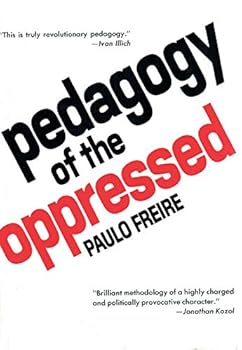Pedagogy of the Oppressed
Select Format
Select Condition 
Book Overview
First published in Portuguese in 1968, Pedagogy of the Oppressed was translated and published in English in 1970. Paulo Freire's work has helped to empower countless people throughout the world and... This description may be from another edition of this product.
Format:Paperback
Language:English
ISBN:0826400477
ISBN13:9780826400475
Release Date:January 1986
Publisher:Continuum
Length:186 Pages
Weight:0.55 lbs.
Dimensions:0.8" x 5.6" x 8.0"
Customer Reviews
4 ratings
Incredible Read
Published by Thriftbooks.com User , 16 years ago
This is a truely radical book. It hits at the very root of a major problem in the human situation. It is pretty heady, but worth the thought. The main message of getting people to realize that they have a voice and that they can take responsbility for their own destiny is a lesson that we all have to learn both in poverty stricken devoloping nations and the U.S. I am a changed person since reading it, and that was 4 years ago!
a must read to understand modern man
Published by Thriftbooks.com User , 24 years ago
KEY CONCEPTS: * Important exploration of dialogue and the possibilities for liberatory practice. * Freire provides a rationale for a pedagogy of the oppressed; * introduces the highly influential notion of banking education; * highlights the the contrasts between education forms that treat people as objects rather than subjects; * explores education as cultural action.In the early 1970's, Brazilian educator, Paulo Freire, visited Harvard and published an English translation of his best known work, Pedagogy of the Oppressed. His general critique of education presented an analysis which challenged the neutrality of the technological model dominant in American schools. He argued that any curriculum which ignores racism, sexism, the exploitation of workers, and other forms of oppression at the same time supports the status quo. It inhibits the expansion of consciousness and blocks creative and liberating social action for change. In Freire's view of education, learning to take control and achieving power are not individual objectives, as in a "boot strap" theory of empowerment. For poor and dispossessed people, strength is in numbers and social change is accomplished in unity. Power is shared, not the power of a few who improve themselves at the expense of others, but the power of the many who find strength and purpose in a common vision. Liberation achieved by individuals at the expense of others is an act of oppression. Personal freedom and the development of individuals can only occur in mutuality with others. In the experience of women's groups, civil rights workers, and many others committed to liberatory action, collective power and collegiality protect the individual far more than authoritarian and hierarchial modes of organization.While Freire's theoretical framework gave many community-based educators grounds for hope, it was his pedagogy--the practical, how-to-do-it methods--which gave them sought-after tools for the reconstruction of urban adult education. Freire advocated dialogue and critical thought as a substitute for "banking" education in which the riches of knowledge were deposited in the empty vault of a learner's mind. He suggested several pedagogical techniques based on the mass literacy campaigns he organized in Brazil and Chile--campaigns integral to broadly defined programs of revolution and social change. It was these techniques which many literacy and basic education programs immediately incorporated into their practice: reflection on the political content of learner's day-to-day experience, the organization of "culture circles" which promote dialogue and peer interaction, and the use of "people's knowledge" as the basis for curriculum.
The education "'bible" of/for the next millennium.
Published by Thriftbooks.com User , 25 years ago
As Freire makes it clear, the "Oppressed", as far as learning and growth are concerned, are not only the disenfranchised but the elite as well. Anyone who hears and responds to the call of service in the extrication of human consciousness from the oblivion of fear, ignorance and greed to the realization of freedom, self-realization, ordinary imperfect reality (and a few other pleasant experiences, chockful of collective joy and progress) will be very happy to have this book. As a (current) teacher of incarcerated adolescents and adults on Rikers Island, New York City - I know that Paulo Freire speaks the truth - and that his so-called abstract theories (by self-involved, rationalizing, "thinking and writing for that next grant" pandering intellectuals) are rooted in the concrete realities of the human condition. Thus, they are catalysts for concrete results in discovery, surprise, laughter and joyful learning (for both student/teachers and teacher/students) in my jailhouse classroom.
Freire obituary
Published by Thriftbooks.com User , 27 years ago
The most widely known educator in the world died on May 2, 1997. Paulo Freire leaves a legacy of dogged struggle for democracy, equality, and the social consciousness required to envision and retain a more just world. In his most widely read book, Pedagogy of the Oppressed, Freire detailed the role of education as a political force---for either liberation or domination. He argued that the process of liberatory education, reflecting the specific intersections of an educator, a student, and a community, must be a process of unveiling, questioning the central issues of life: work, culture and the construction of knowledge. He opposed his pedagogy to "banking " practices, rote memorization of the teacher's facts, which he insisted only reproduce injustice by aculturing the student to passivity. A critical education, in contrast, assists the students in methods to unravel her world--and the words which hide or expose its realities, While Freire was never able to resolve the shipwreck contradiciton of socialism, critical consciousness versus national economic development, his insistence on the need for new styles of education and leadership, coupled with his own lifetime of activism, leave an indominatable testimony of hope. Most educators want to change the world. Freire did






